You’ve seen the sensational headlines. And if you’re a regular Health Watch reader, you may not be buying what they have to say…
We certainly don’t.
A new study on resveratrol has led to some bold claims about one of the most well-known—but poorly understood—antioxidants in existence. The headlines tell you the resveratrol in red wine won’t help you live longer. They also say it doesn’t boost your health the way we thought. But there are some major flaws in this study…
First, let’s take a look at the study. The design wasn’t great. In fact, it wasn’t even good.
Researchers from Johns Hopkins University looked at data from 783 Italians over the age of 65. At the beginning of the study, they gave a urine sample. This was to measure the amount of resveratrol from foods in their urine. Every three years, subjects completed a survey about their diet. This went on for nine years.
At the end of the study, researchers claimed that resveratrol levels had no significant effect on inflammation, heart disease, cancer, or death rates.1
This is why the headlines dismiss the benefits of resveratrol… But they’re leaving a few very important factors out.
The study relied on survey results. It’s impossible for subjects to be completely accurate with their answers. And that’s if they are even trying to be honest in the first place. Then there’s the fact that there was only one urine test…at the beginning of the study. The researchers have no idea how subjects’ levels may have changed over the course of nine years…so they just assumed it stayed the same.2 That doesn’t seem very scientific. But that’s not even the biggest problem.
Red wine has more resveratrol in it than almost any other natural source.3 But the actual amount still isn’t very high. One fluid ounce of red wine will only give you around 0.09 mg. To even get one milligram of resveratrol, you’d have to drink at least two glasses of red wine.4 And it doesn’t help matters that the amount per ounce can vary drastically from wine to wine.
In other words, you’ll have to take a resveratrol supplement if you want to lower oxidative stress and fight inflammation.5 In studies, 8 mg a day was enough to help decrease C-reactive protein levels—a major marker of inflammation—by up to 26% in one year.
Like with any supplement, you want to make sure your resveratrol is coming from natural sources. It’s easy to find a quality, natural supplement in health stores and online. Look for one that gives you 10-20 mg of trans-resveratrol. It’s the most bioavailable form that comes from skins, seeds, and stems of wine grapes.6
A natural resveratrol supplement may help lower inflammation and make you feel younger. It may even help support a healthy heart. But it’s not the only way…
In fact, we have something really special in the works. We can’t tell you what it is—yet. But trust us when we say it’ll be worth the wait.
Keep an eye out for more details on this exciting, unique natural breakthrough in the coming weeks.
Like this Article? Forward this article here or Share on Facebook.
References:
1http://archinte.jamanetwork.com/article.aspx?articleid=1868537
2http://www.foxnews.com/health/2014/05/13/dr-manny-why-new-study-on-resveratrol-isnt-really-bad-news-for-red-wine/
3http://winefolly.com/tutorial/health-benefits-of-red-wine/
4http://www.lef.org/magazine/mag2007/mar2007_report_resveratrol_04.htm
5http://onlinelibrary.wiley.com/doi/10.1002/mnfr.201100143/full
6http://www.reserveage.com/what-is-resveratrol-what-is-trans-resveratrol-pg-41.html

